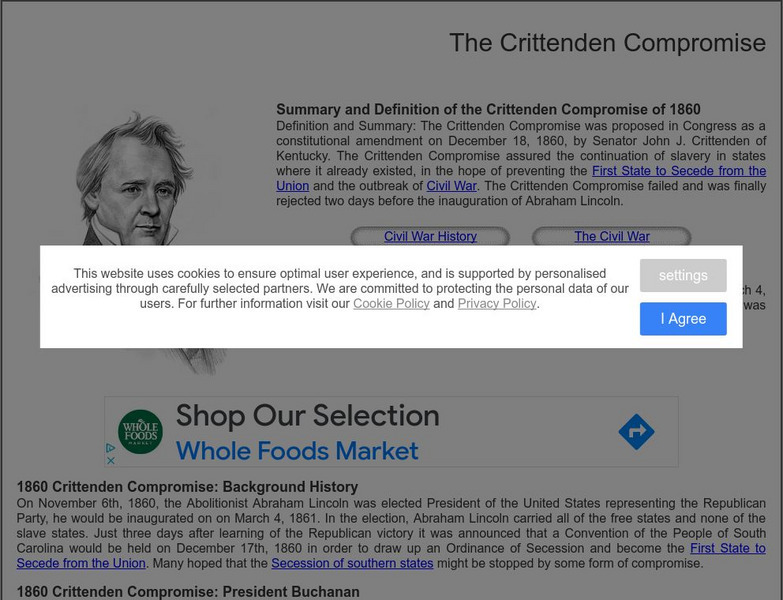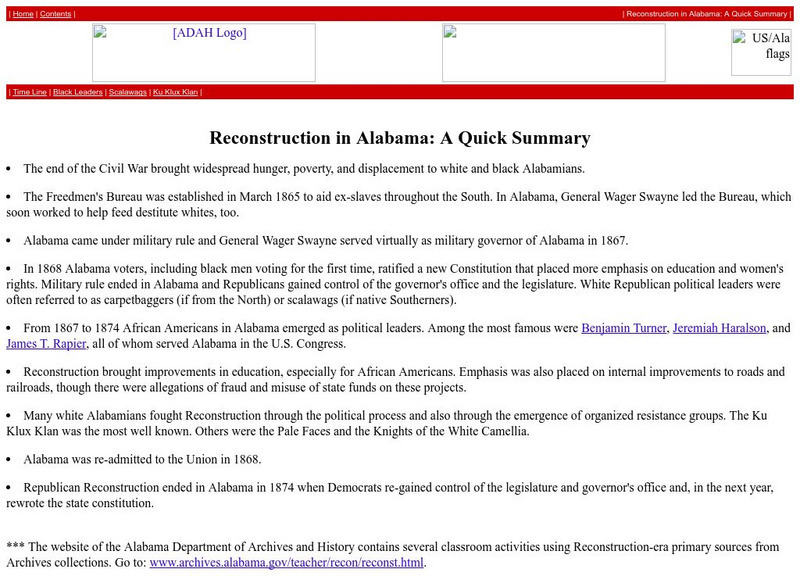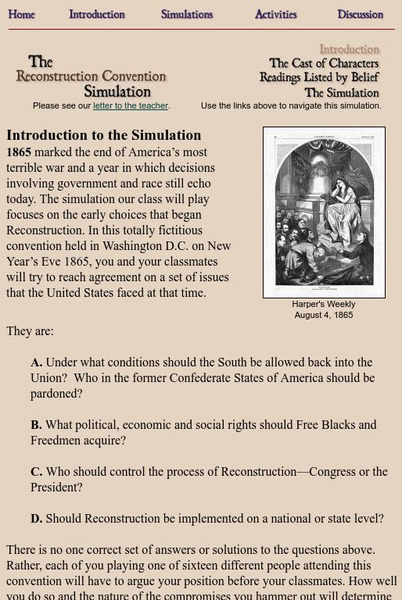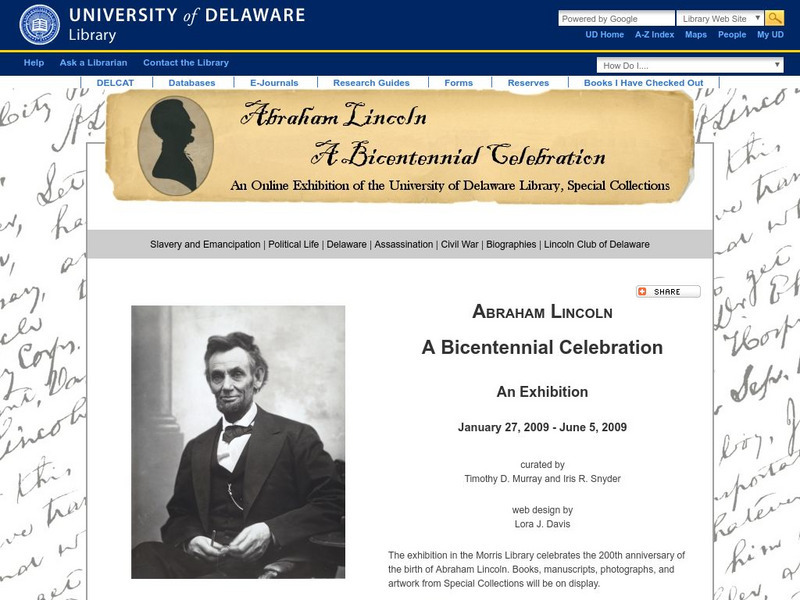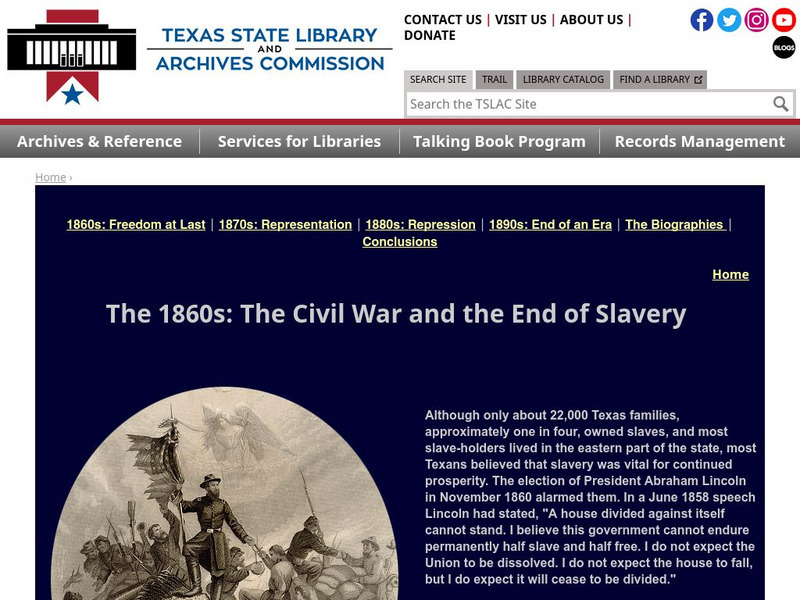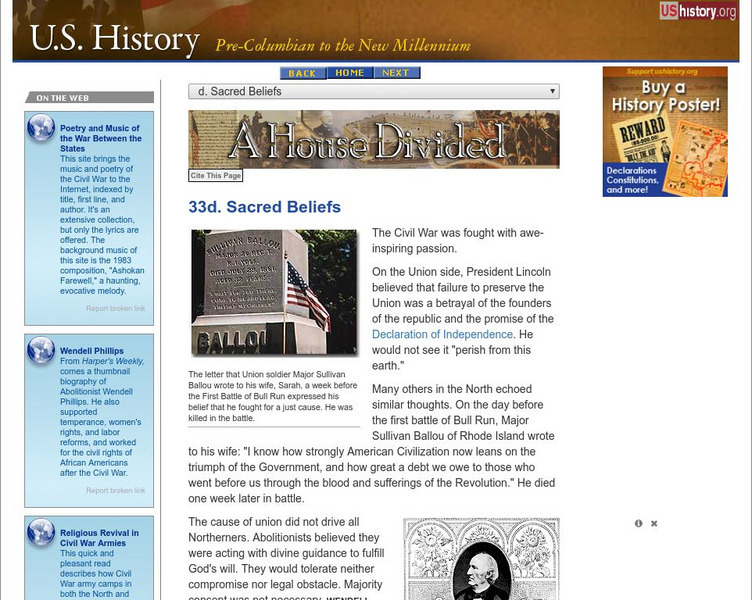Hi, what do you want to do?
Library of Congress
Loc: Slavery in the United States: Primary Sources
This lesson introduces students to primary sources- what they are, their great variety, and how they can be analyzed. The lesson begins with an activity that helps students understand the historical record. Students then learn techniques...
Louisiana Department of Education
Louisiana Doe: Louisiana Believes: Grade 7 Social Studies: Slavery Compromise
Students develop and express claims through discussions and writing which compare and contrast how the early compromises over slavery, including their effectiveness and impact on different regions of the United States.
Annenberg Foundation
Annenberg Learner: American Passages: Race and Identity in Antebellum America
This unit features authors of Antebellum America and how they portray the American identity through their literature. Click on the tabs to explore the various resources available to enhance this unit.
Digital History
Digital History: America's Reconstruction
An overview of Reconstruction provided by the University of Houston. Provides images and the political climate that occurred during this part of American History.
Khan Academy
Khan Academy: Ap Us History: 1844 1877: Reconstruction: Life After Slavery
Discusses what life was like for African Americans who were freed from slavery after the Civil War. Includes questions for students.
PBS
Pbs: Slave to Sharecropper
This collection of resources examines the life and work of freed slaves after the Civil War. Includes questions and answers on sharecropping in the American South, as well as a personal account from a former slave who became a sharecropper.
Siteseen
Siteseen: Civil Conflict: The Crittenden Compromise of 1860
Web page on the Crittenden Compromise of 1860 which assured the continuation of slavery where it already existed in an attempt to appease Southerners and halt secession of Southern states from the Union.
Siteseen
Siteseen: Civil Conflict: The Corwin Amendment
Web page on the proposed Corwin Amendment which, if ratified, would have forbade Congress from interfering with states' right to make decision to slavery. Site contains textual information, video [3:28], and fun facts for students.
Digital History
Digital History: Civil War in Kansas [Pdf]
The Compromise of 1850 did not solve all the slavery issues in the territories, which was not surprising. Read about the Kansas-Nebraska Act, put forth by Sen. Stephan Douglas, who proposed that the issue be decided by popular...
Digital History
Digital History: The Civil War Begins [Pdf]
The election of 1860 showed the deep divisions that split the country. With four candidates representing four very different approaches to the issue of slavery, the outcome resulted in the secession of South Carolina, followed eventually...
University of California
History Project: The Trial and Execution of John Brown
Using primary source documents, high school lesson plan focuses on John Brown, the events at Harper's Ferry, and his trial and execution. Included are excerpts from 16 primary source documents to aid in the research of writing this paper.
PBS
Pbs: Angelina and Sarah Grimke
A biography of the Grimke sisters, women who were before their time in so many ways and who fought for equality of the sexes.
Other
The Spread of u.s. Slavery, 1790 1860
Presents population maps of enslaved and free African Americans before the Civil War based on census population.
Columbia University
Columbia University: Columbia University & Slavery 10. Columbia
This website was created by faculty, students, and staff to publicly present information about Columbia's historical connections to the institution of slavery. Like most northern colleges, Columbia admitted no black students before the...
PBS
Pbs: Africans in America: Slavery and the Origins of the Civil War
An article by Columbia University historian Eric Foner that discusses how long-standing views of the role of slavery in America began to be challenged during the civil rights era of the 1960s by a new generation of historians, whose work...
Ducksters
Ducksters: Kids History: John Brown and the Harpers Ferry Raid
Explore an attempt at a slave uprising at Harpers Ferry to end slavery by John Brown during the Civil War on this site.
Department of Defense
Do Dea: Ap Us History: Unit 4: A House Divided
This extensive learning module examines how the United States became more connected with the world as it pursued an expansionist foreign policy, became the destination for many new immigrants, and encouraged migration to the Pacific...
Other
Alabama.gov: Reconstruction
Learn facts about life in the state of Alabama after the Civil War.
Harp Week
Education at Harp week.com: The Reconstruction Convention Simulation
A simulation activity where students participate in a convention at the end of the American Civil War that never actually took place. Together they grapple with the issues that faced America in 1865 in dealing with the demise of slavery...
McGill University
Mc Gill University: Collection of Lincolniana
Click Enter to find a world of Lincolniana! Start with the Virtual Exhibit that offers collections of manuscripts on Lincoln, the Man, the Civil War, Slavery & Emancipation, Assassination & Death, Trial & Execution of the...
Other
University of Delaware: Abraham Lincoln: A Bicentennial Celebration
Commemorating Abraham Lincoln's 200th birthday, this exhibition provides several documents and photographs remembering the President's life. Resources cover his political career, slavery, the civil war and his assassination.
Texas State Library and Archives Commission
Texas State Library and Archives Commission: The 1860s: The Civil War and the End of Slavery
What is the origin of the Texas holiday Juneteenth? Here is a brief article on how this day is connected to the Emancipation Proclamation and the freeing of slaves in the South.
Independence Hall Association
U.s. History: Sacred Beliefs
At the beginning of the Civil War people in both the North and the South held firm beliefs about the reasons for the war. Some wanted to preserve the Union, others to end slavery. In the South the question was about states' rights and...
CommonLit
Common Lit: "A Nation Divided: North vs. South" by Us history.org
The American Civil War was fought within the United States from 1861 to 1865. The election of President Abraham Lincoln in 1860 increased tension between the North and South. Lincoln's political party was interested in stopping the...











